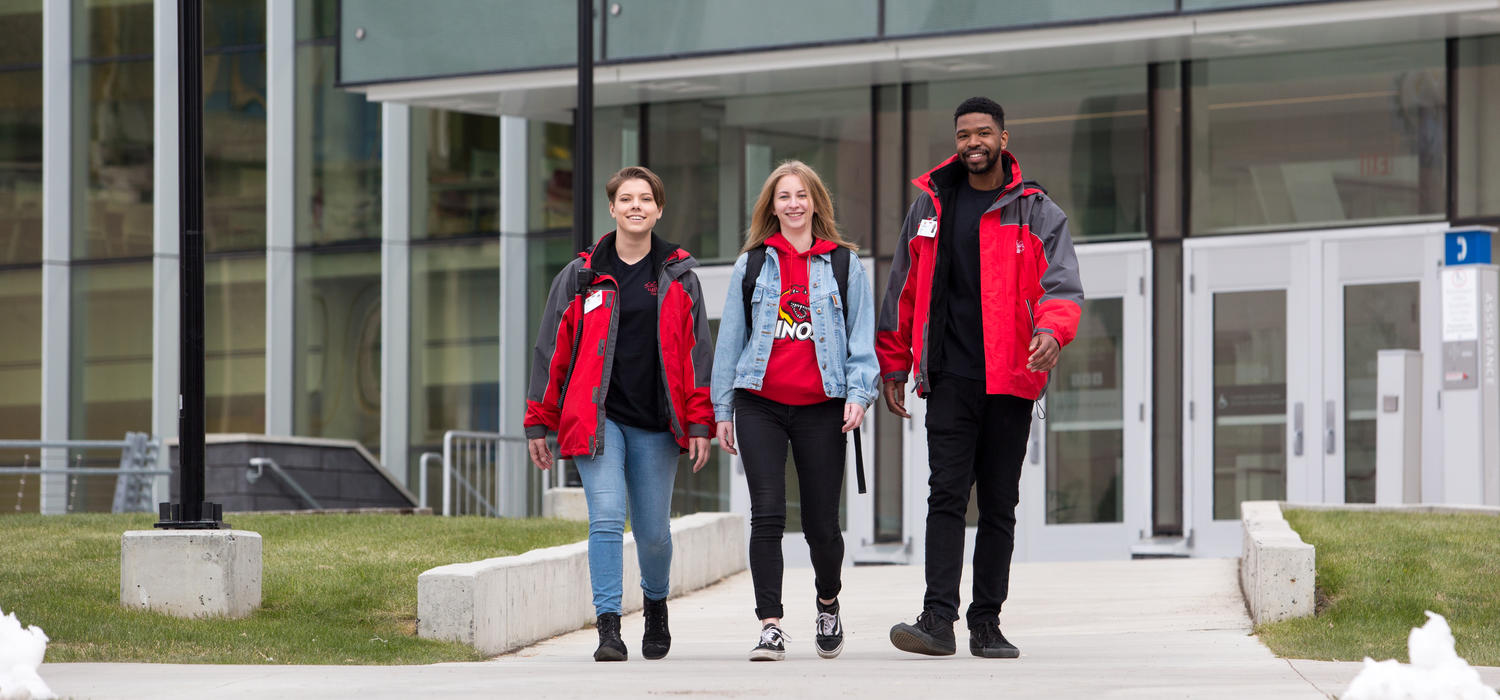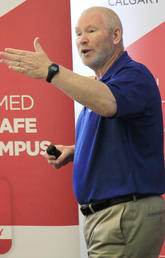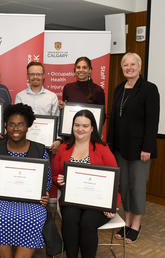Sept. 16, 2019
Check out five ways to stay safe and well at UCalgary

Many UCalgary community members will partake in Safety and Wellness Week events and sessions, but even if you can’t make it to see a keynote speaker or sit down for Coffee with Campus Security, there’s plenty you can do to stay safe and well on campus all the time.
1. Download UC Emergency Mobile — then use it
UC Emergency Mobile delivers information and updates directly to your phone during an emergency situation, but it also offers additional functionality that you can use to keep yourself safer on campus.
Use SoloSafe when you’re working or studying alone to check in with Campus Security — if you don’t check out by your planned departure time, Campus Security will confirm that you’re OK.
Use HelpLine to connect with Campus Security and 911 at the touch of a button. If you turn on location services, the app can pinpoint your location and get help on the scene quickly. Also offered through HelpLine, TipLine is a fast and easy way to report safety or security concerns.
2. Learn it, visualize it, rehearse it
Read through UCalgary’s emergency procedures — we have them for severe weather, armed assailants, hazardous material spills, bomb threats and more — imagine implementing the procedures for yourself, in your own space.
Do you know every exit and assembly point for your building? Do you know how to shelter in place? Are you prepared to run, hide and fight (in that order) if you’re threatened by an armed assailant?
Annual evacuation drills are currently underway until Sept. 24 — don’t miss the opportunity to practise your evacuation plan together with your co-workers.
3. Protect your body and your mind
Staying safe from hazards on campus can mean something very different depending on what you do here. UCalgary has several occupational health programs for immunizations, audiometric testing, respiratory protection and ergonomics. Staff Wellness also offers many resources, workshops and programs that support good mental health.
There’s a lot to learn when it comes to Environment, Health and Safety, offering more than 30 in-class and online courses in everything from safe lifting to biosafety..
If you feel uncomfortable walking alone on campus for any reason, Safewalk will accompany you to any destination on campus 24 hours a day, seven days a week. To request a Safewalk, call 403-220-5333, use one of the Help Phones on campus (they’re not just for emergencies), or approach an on-duty Safewalk volunteer.
4. Know who to call
It’s all about who you know — as a UCalgary community member, you’re connected to a network of useful resources.
- 911: imminent or life-threatening situations | 911
- Campus Security: non-urgent safety or security concerns | 403-220-5333.
- Student Wellness Services: medical and mental health services and after-hours telephone support for mental health concerns | 403-210-9355.
- Staff Wellness: WellBeing and WorkLife, occupational health and sick leave support | 403-220-2918
- Environment, Health and Safety: incident reporting and health and safety training and programs | 403-220-6345
- Sexual Violence Support Advocate: assistance if you’ve experienced sexual violence | 403-220-2208 |svsa@ucalgary.ca
5. Register for Safety and Wellness Week sessions before 4 p.m. Sept. 16
This week, it’s free and easy to pick up some new skills and information that could make a big difference when it matters most.
Prepare for the *Realistic* Worst while Travelling — Keynote Speaker and Lunch
Sept. 17 | 12:10 - 1 p.m. | Main Campus, Legacy Suite, Dining Centre
The range of issues that can affect foreign travellers is becoming increasingly varied, and learning how to prepare for and respond to the vast array of challenges foreign travellers can face is important. From cyber and information security threats, to natural disasters, to the low likelihood / high impact hostile security threats like kidnapping and active assailants, the challenge can be daunting, especially for less experienced travellers and younger people like students. In this session, International SOS’ Canadian Security Director Paul Doucet will introduce a four-point framework for managing risks both at the individual and organization level. It all starts with defining what the *realistic* worst-case scenario is, by threat category and by location.
Lunch provided. Registration is now closed.
Enhancing Safety Through Situational Awareness — Keynote Speaker and Lunch
Sept. 18 | 12:10 - 1 p.m. | Main Campus, Senate Room
Back by popular demand, Gary McDougal, retired police officer and qualified hostage and crisis negotiator, will discuss how to use awareness and risk assessment to minimize risk and enhance your safety on and off campus. Participants will leave with new tools to help them respond more quickly and confidently in the event of a potential threat.
Lunch provided. Registration is now closed.


